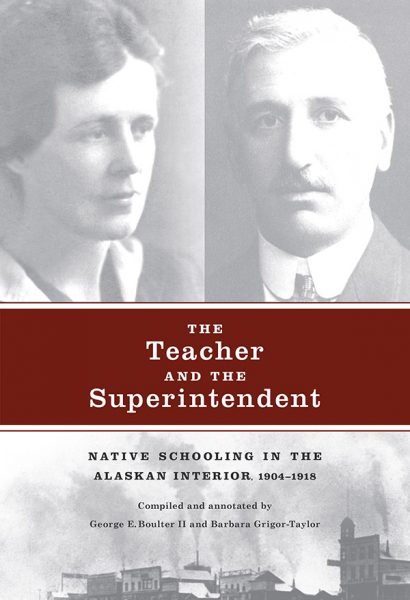Mountain Masculinity The Life and Writing of Nello “Tex” Vernon-Wood in the Canadian Rockies, 1906-1938
edited by Andrew Gow and Julie Rak

Subjects: Education, History, Memoir, U.S. History
Series: Our Lives: Diary, Memoir, and Letters
Imprint: AU Press
From its inception in 1885, the Alaska School Service was charged with the assimilation of Alaskan Native children into mainstream American values and ways of life. Working in the missions and schools along the Yukon River were George E. Boulter and Alice Green, his future wife. Boulter, a Londoner originally drawn to the Klondike, had begun teaching in 1905 and by 1910 had been promoted to superintendent of schools for the Upper Yukon District. In 1907, Green left a comfortable family life in New Orleans to answer the “call to serve” in the Episcopal mission boarding schools for Native children at Anvik and Nenana, where she occupied the position of government teacher. As school superintendent, Boulter wrote frequently to his superiors in Seattle and Washington, DC, to discuss numerous administrative matters and to report on problems and conditions overall.
From 1906 to 1918, Green kept a personal journal—hitherto in private possession—in which she reflected on her professional duties and her domestic life in Alaska. Collected in The Teacher and the Superintendent are Boulter’s letters and Green’s diary. Together, their vivid, first- hand impressions bespeak the earnest but paternalistic beliefs of those who lived and worked in immensely isolated regions, seeking to bring Christianity and “civilized” values to the Native children in their care. Beyond shedding private light on the missionary spirit, however, Boulter and Green have also left us an invaluable account of the daily conflicts that occurred between church and government and of the many injustices suffered by the Native population in the face of the misguided efforts of both institutions.
.
A fascinating account of the not so distant past when two worlds came together, that of Europe, with its missionary zeal, and that of the Indigenous peoples of the North. One cannot help but sympathize with the sincere hopes and bitter disappointments of the newcomers, as they struggled to impose a new social and moral order on another culture. At the same time, one can easily sense the spiritual devastation wrought by missionaries who, armed with their unquestioned convictions, informed the Native population that their traditional answers to all the key questions in life were wrong and had been wrong throughout their history as a people. This is book is a raw primary source, at once poignant, moving, and revelatory.
Wade Davis, Explorer-in-Residence, National Geographic Society
… a valuable collection of documents related to colonialism and schooling in the Alaskan Interior at the beginning of the twentieth century. […] Boulter II and Grigor-Taylor have done a good job of editing and annotating important records, which reveal much about the lives of teachers in Native schools of the period, and hopefully their publication will spur new scholarly analysis.
Historical Studies in Education / Revue d’histoire de l’éducation
The letters and diary entries of these missionaries are stark windows onto the ordinariness of colonisation and the horrific natural/unnaturalness of the destruction of indigenous ways of life. However, just as life, in even the darkest and most violent of storms, has beauty and joy, these texts are filled with the intricacies of the daily expressions of friendship, love, and commitments to unselfish purposes.
History of Education
This work is licensed under a Creative Commons License (CC BY-NC-ND 4.0). It may be reproduced for non-commercial purposes, provided that the original author is credited.